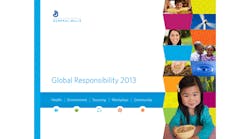Firms that Don't Publish Corporate Responsibility Reports Are 'Swimming Against the Tide'
Publishing corporate responsibility reports has become a well-established practice, a KPMG LLP survey indicates. The survey found that 86 percent of the 100 largest U.S. companies now formally report their corporate responsibility efforts, up from 83 percent in 2011 and 74 percent in 2008.
The biennial KPMG survey found that 71 percent of the world's 100 largest companies publish corporate-responsibility (CR) reports, up from 71 percent in 2011. Of the world's largest 250 companies, 93 percent now publish CR reports.
CR reports highlight companies' activities and accomplishments in areas such as environmental stewardship, corporate philanthropy, workplace safety, community involvement and ethical sourcing.
"Companies should no longer ask whether or not they should publish a CR report, even in the absence of regulatory requirements to do so," said John Hickox, KPMG's Americas leader for climate change and sustainability. "That debate is over. Companies that do not publish CR reports need to ask themselves whether it benefits them to keep swimming against the tide."
Globally, the Americas region has the highest percentage of companies that publish CR reports, thanks to increased participation in Latin America, where 76 percent of firms publish CR reports.
In the Asia Pacific region, 71 percent of firms report on their CR activities, up from 49 percent in 2011, reflecting the largest regional increase over the last two years.
The CR reports published by the world's largest 250 companies frequently identify a social and/or environmental challenge affecting their business, KPMG notes. Climate change, material-resource scarcity, energy and fuel are the most commonly cited challenges, and eight in 10 companies report that they have a strategy to manage the risks and opportunities associated with these issues.
Eighty-seven percent of companies report that social and environmental challenges present business opportunities. The most commonly cited opportunity is innovation of new products and services (72 percent), followed by the opportunity to strengthen brands and corporate reputation (51 percent); improve market position/grow market share (36 percent); and cut costs (30 percent), according to KPMG.
"Companies should no longer see corporate sustainability as solely a moral issue, and instead opportunistically view it as a way for their organization to improve their brand and mitigate risk to their core business functions," said Hickox. "A growing number of investors are accepting that environmental and social factors could put company value at stake, and that there are ways to mitigate and maximize the financial impacts associated with those risks and opportunities."
